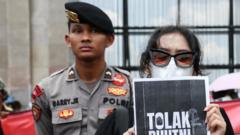As the Indonesian parliament passes a controversial law enabling the military to engage more actively in government, a wave of protests has erupted, echoing historical fears of returning to the oppressive Suharto era. Critics argue that the legislative changes threaten the fragile democratic gains achieved since Suharto's ousting in 1998.
**Indonesia's Controversial Military Law Sparks Protests Amid Fears of Authoritarianism**

**Indonesia's Controversial Military Law Sparks Protests Amid Fears of Authoritarianism**
Indonesia faces a backlash as parliament approves law enhancing military roles in governance, reviving fears of past dictatorship.
As thousands gather outside parliament to voice dissent, opposition figures and human rights advocates warn of the potential implications for civil liberties and democratic governance. The law, endorsed by President Prabowo Subianto, a figure linked to Suharto's regime, allows military personnel to hold positions in civilian roles without resigning from the military. Activists decry this as a step toward a deepening military influence over Indonesia's political landscape.
In recent days, Indonesia has witnessed escalating protests against legislative changes that critics believe threaten the country's democratic integrity. The new law, backed by President Prabowo Subianto—a former special forces commander—allows military officers to fill civilian roles while remaining active military personnel, stirring memories of the Suharto dictatorship.
Pro-democracy groups, including the Indonesian Association of Families of the Disappeared (KontraS), have gathered outside parliament, denouncing the move as a regression toward authoritarianism. Wilson, an activist, voiced concerns that this reflects a broader attack on democratic principles, stating, "Democracy has been killed by the House of Representatives."
The amendments to Indonesia’s military law enable active duty military personnel to occupy positions in 14 civilian departments, an increase from 10, raising alarms among citizens. Demonstrators chanted slogans calling for the military's return to barracks, with nearly a thousand people participating by Thursday evening.
According to local human rights organization Imparsial, approximately 2,600 active military officers were already occupying civilian roles prior to the amendments. Analysts warn that the consolidation of power under Prabowo could prioritize state stability at the expense of democratic freedoms.
The proposed military involvement in governance areas, from managing public programs to influencing the justice system, could deepen the complications surrounding military accountability. Critics like Virdika Rizky Utama question how active military figures can ensure impartiality in positions such as the Attorney General's Office.
Defending the legislative changes, Defense Minister Sjafrie Sjamsoeddin cited global military advancements as a justification for transforming the military’s role, indicating a shift towards addressing both conventional and non-conventional conflicts. Meanwhile, organizations such as Human Rights Watch have raised concerns that this increased military influence undermines commitments to human rights and democratic integrity.
In response to the legislature's rapid adoption of the amendments, activists vowed to continue protesting until their demands are met. "This long struggle cannot stop just because the law has been passed," stated Sukma Ayu, an undergraduate student, reflecting the determination among youth and civic groups to stand against what they view as creeping authoritarianism.
In recent days, Indonesia has witnessed escalating protests against legislative changes that critics believe threaten the country's democratic integrity. The new law, backed by President Prabowo Subianto—a former special forces commander—allows military officers to fill civilian roles while remaining active military personnel, stirring memories of the Suharto dictatorship.
Pro-democracy groups, including the Indonesian Association of Families of the Disappeared (KontraS), have gathered outside parliament, denouncing the move as a regression toward authoritarianism. Wilson, an activist, voiced concerns that this reflects a broader attack on democratic principles, stating, "Democracy has been killed by the House of Representatives."
The amendments to Indonesia’s military law enable active duty military personnel to occupy positions in 14 civilian departments, an increase from 10, raising alarms among citizens. Demonstrators chanted slogans calling for the military's return to barracks, with nearly a thousand people participating by Thursday evening.
According to local human rights organization Imparsial, approximately 2,600 active military officers were already occupying civilian roles prior to the amendments. Analysts warn that the consolidation of power under Prabowo could prioritize state stability at the expense of democratic freedoms.
The proposed military involvement in governance areas, from managing public programs to influencing the justice system, could deepen the complications surrounding military accountability. Critics like Virdika Rizky Utama question how active military figures can ensure impartiality in positions such as the Attorney General's Office.
Defending the legislative changes, Defense Minister Sjafrie Sjamsoeddin cited global military advancements as a justification for transforming the military’s role, indicating a shift towards addressing both conventional and non-conventional conflicts. Meanwhile, organizations such as Human Rights Watch have raised concerns that this increased military influence undermines commitments to human rights and democratic integrity.
In response to the legislature's rapid adoption of the amendments, activists vowed to continue protesting until their demands are met. "This long struggle cannot stop just because the law has been passed," stated Sukma Ayu, an undergraduate student, reflecting the determination among youth and civic groups to stand against what they view as creeping authoritarianism.





















